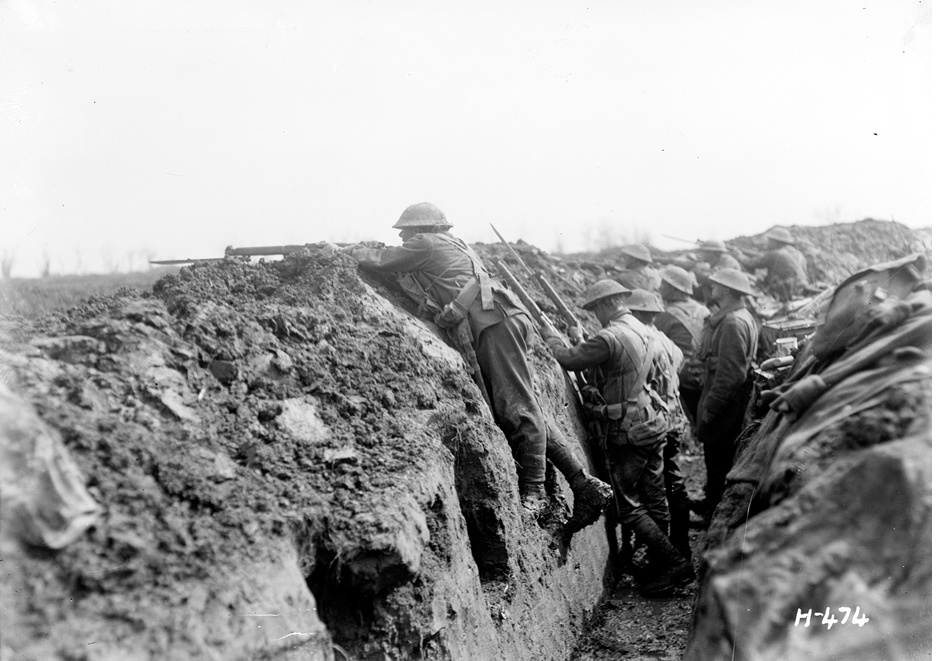History has always fascinated me. Once you look deeply into it, you see the seeds of an important event being planted years, decades or even centuries before. Nothing happens out of thin air.
For instance, it is widely agreed World War Two was a direct result of the way World War One ended. A hundred years ago, Adolph Hitler was a disgruntled corporal in the defeated and humiliated German army. His story was just starting.
Certainly, every war has its lineage traced to the war which preceded it and prepares the way for the next conflict. War is like that.
I know many people look around the world today and view it as the worst it has ever been, but in many ways, one hundred years ago, in 1918, the world might have been at the lowest point in all history. Some might suggest it was a simpler time or another era was worse, but it was a terrible time, worldwide.
A hundred years ago, many Christians felt the end of the world was near and Christ’s return was imminent. And they had good reasons to feel that way.
In 1918, The Great War was at a climax with ten thousand people dying every day.
From 1914-1918, over fifteen million people died directly or indirectly as a result of the war.
The Russian Revolution was in process, with the Russians eventually signing a treaty with Germany to stop the fighting between them so Russian troops could focus on fighting and controlling the Russian people. Countless millions died from 1917-1922 under Lenin. Estimates run between five and ten million.
The Islamic Ottoman Empire (modern day Turkey) used the chaos of The Great War to exterminate 1.5 million Armenians, Assyrians and Greeks. The stories of how the killings were carried out, rival the worst genocide stories ever told.
Mass death was part of the world, a hundred years ago.
Racial division in the United States boiled over in 1917 in East St. Louis, Illinois when white workers, angry at black workers moving into the area looking for employment invaded a black neighborhood of the city, set buildings ablaze, then shot and killed dozens of people fleeing the fires.
Later in 1918, the US government, trying to quiet an angry citizenry, passed the Sedition Act, which made it a crime to criticize the government’s handling of the war.
So much for civil rights and the Bill of Rights.
Ah, but people cared about their neighbors and didn’t have to lock their doors.
If you say so.
Then, starting early March 1918 in Kansas, a virulent strain of the H1N1 flu virus began to spread, eventually killing over a half-million people in the US over the next three years. During this time, the average life expectancy of a person in America dropped by twelve years.
The flu pandemic was a global catastrophe of staggering proportions. Every country was affected, some more than others.
The entire population of towns in Alaska died.
Nine thousand people died on the island of Fiji in the south Pacific.
By the time it stopped in late 1920, between 50 and 100 million people died worldwide, accounting for up to 5% of the world’s population at the time.
On many levels, it could be concluded the world was a worse place a hundred years ago than it is today.
So, what were authors writing a hundred years ago?
The number one bestselling novel in 1919 was The Four Horsemen of the Apocalypse by V. Blanco Ibanez.
In fiction, Zane Grey was doing great. Maybe a bit of escape fiction with heroes and bad guys in the old west.
Eleanor Porter, who wrote Pollyanna a few years earlier was continuing to write best sellers every year.
Gene Stratton Porter, Harold Bell Wright, Grace Livingston Hill and Rudyard Kipling were popular.
Non-Fiction was covering history, mainly related to the war. But there was always room for lighthearted escapism as bestsellers included, Albert Paine’s compilation of Mark Twain’s letters and actor Douglas Fairbanks wrote Laugh and Live. (William Strunk and E.B. White published The Elements of Style in 1918)
No matter the period of history, authors cover it as a story or offer a distraction from it with a story. They did it one hundred years ago and today.



 Morality and the Book Contract
Morality and the Book Contract

Fascinating, Steve. Yes, every generation thinks they’re the last one. But I look at 1948 when Israel became a nation again and I think that is pivotal!
I will have to look up more books by Pollyanna’s author I had no idea she had published other books. I enjoyed that story as a child.
Thanks for an interesting article to start a chilly morning.
It’s writers who cauterize the wounds of their time.
Once again you have a way with words, Andrew!
Dan, This is sobering. Thank you for shedding some light on a time period we tend to romanticize. And for helping us appreciate what we have today! We have much to be thankful for.
I printed this post out for my husband to read with his morning coffee. It’s so healthy to remember history – and never stop learning. Thank you, Dan!
Great idea to get a different POV. Thanks for a stimulating blog!
It’s so interesting how we as a society focus on the now and forget the past. There were absolutely horrid events that people went through that trump our problems of today. Thanks for the reminder of remembering the lessons of the past to put towards our future!
The more I see of life, the less surprised I am by the ability of people to do horrible things. And I don’t expect it to stop. People remain unchanged at their core without God’s direct intervention. It’s only the technology that’s different between “then” and “now,” making it easier to kill millions instead of hundreds with a single attack.
Repentance and redemption are what can change that, but is the world ready for that? Are individuals ready for that? Are we doing our part to reach out to others so they will know Who provides the only Way out of the human mess?
Dan, have you watched WWII in color on Netflix? It is equal parts enthralling and horrifying, as it used real footage from the wars and puts them in color (vs black and white as they originally were filmed.) if you haven’t seen it yet, I highly recommend.
Great perspective and insight, Dan!
Dan, Thank You for Your sharing these aspects of history with us! i felt i was sort of well versed in those portions of our past but You mentioned several things i had not heard of.
“Thank You for Your contribution to my continuing education!”*
Curtis Delk Rose
* i like to think i made that quote up myself!